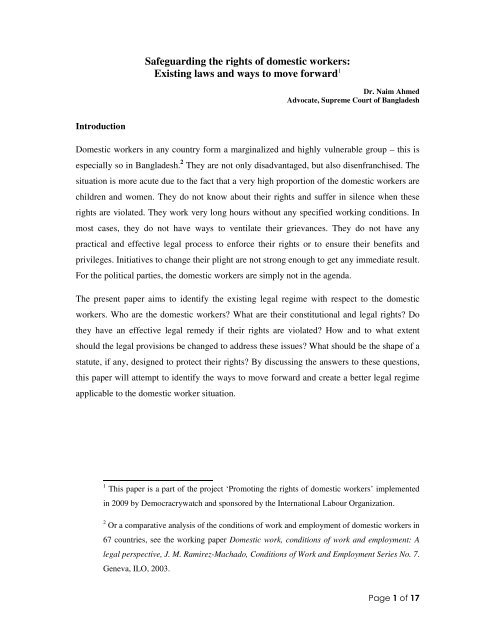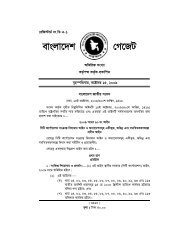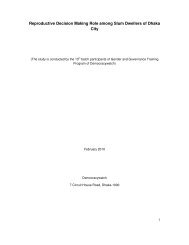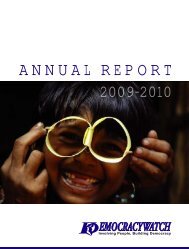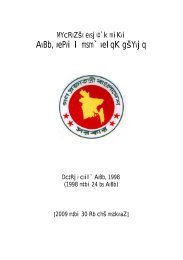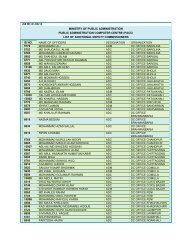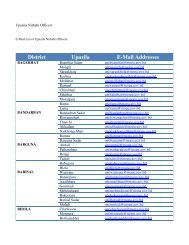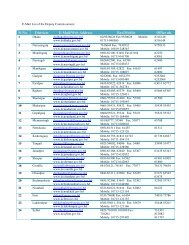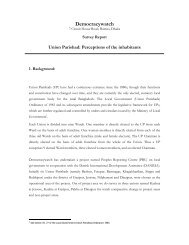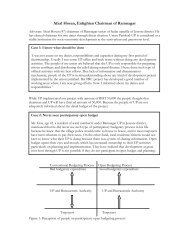Safeguarding the rights of domestic workers: Existing laws and ways ...
Safeguarding the rights of domestic workers: Existing laws and ways ...
Safeguarding the rights of domestic workers: Existing laws and ways ...
Create successful ePaper yourself
Turn your PDF publications into a flip-book with our unique Google optimized e-Paper software.
<strong>Safeguarding</strong> <strong>the</strong> <strong>rights</strong> <strong>of</strong> <strong>domestic</strong> <strong>workers</strong>:<br />
<strong>Existing</strong> <strong>laws</strong> <strong>and</strong> <strong>ways</strong> to move forward 1<br />
Dr. Naim Ahmed<br />
Advocate, Supreme Court <strong>of</strong> Bangladesh<br />
Introduction<br />
Domestic <strong>workers</strong> in any country form a marginalized <strong>and</strong> highly vulnerable group – this is<br />
especially so in Bangladesh. 2 They are not only disadvantaged, but also disenfranchised. The<br />
situation is more acute due to <strong>the</strong> fact that a very high proportion <strong>of</strong> <strong>the</strong> <strong>domestic</strong> <strong>workers</strong> are<br />
children <strong>and</strong> women. They do not know about <strong>the</strong>ir <strong>rights</strong> <strong>and</strong> suffer in silence when <strong>the</strong>se<br />
<strong>rights</strong> are violated. They work very long hours without any specified working conditions. In<br />
most cases, <strong>the</strong>y do not have <strong>ways</strong> to ventilate <strong>the</strong>ir grievances. They do not have any<br />
practical <strong>and</strong> effective legal process to enforce <strong>the</strong>ir <strong>rights</strong> or to ensure <strong>the</strong>ir benefits <strong>and</strong><br />
privileges. Initiatives to change <strong>the</strong>ir plight are not strong enough to get any immediate result.<br />
For <strong>the</strong> political parties, <strong>the</strong> <strong>domestic</strong> <strong>workers</strong> are simply not in <strong>the</strong> agenda.<br />
The present paper aims to identify <strong>the</strong> existing legal regime with respect to <strong>the</strong> <strong>domestic</strong><br />
<strong>workers</strong>. Who are <strong>the</strong> <strong>domestic</strong> <strong>workers</strong>? What are <strong>the</strong>ir constitutional <strong>and</strong> legal <strong>rights</strong>? Do<br />
<strong>the</strong>y have an effective legal remedy if <strong>the</strong>ir <strong>rights</strong> are violated? How <strong>and</strong> to what extent<br />
should <strong>the</strong> legal provisions be changed to address <strong>the</strong>se issues? What should be <strong>the</strong> shape <strong>of</strong> a<br />
statute, if any, designed to protect <strong>the</strong>ir <strong>rights</strong>? By discussing <strong>the</strong> answers to <strong>the</strong>se questions,<br />
this paper will attempt to identify <strong>the</strong> <strong>ways</strong> to move forward <strong>and</strong> create a better legal regime<br />
applicable to <strong>the</strong> <strong>domestic</strong> worker situation.<br />
<br />
1 This paper is a part <strong>of</strong> <strong>the</strong> project ‘Promoting <strong>the</strong> <strong>rights</strong> <strong>of</strong> <strong>domestic</strong> <strong>workers</strong>’ implemented<br />
in 2009 by Democracrywatch <strong>and</strong> sponsored by <strong>the</strong> International Labour Organization.<br />
2 Or a comparative analysis <strong>of</strong> <strong>the</strong> conditions <strong>of</strong> work <strong>and</strong> employment <strong>of</strong> <strong>domestic</strong> <strong>workers</strong> in<br />
67 countries, see <strong>the</strong> working paper Domestic work, conditions <strong>of</strong> work <strong>and</strong> employment: A<br />
legal perspective, J. M. Ramirez-Machado, Conditions <strong>of</strong> Work <strong>and</strong> Employment Series No. 7.<br />
Geneva, ILO, 2003.
Defining ‘<strong>domestic</strong> worker’<br />
The only definition <strong>of</strong> a <strong>domestic</strong> worker under <strong>the</strong> <strong>laws</strong> <strong>of</strong> Bangladesh can be found in <strong>the</strong><br />
Domestic Servants’ Registration Ordinance 1961. 3 It says that ‘<strong>domestic</strong> servant’ includes<br />
every person who renders <strong>domestic</strong> services (i.e. services pertaining to household affairs) to<br />
is employer in lieu <strong>of</strong> wages or any o<strong>the</strong>r consideration. 4<br />
Accordingly, <strong>domestic</strong> work implies work carried on in <strong>and</strong> around <strong>the</strong> home such as<br />
cooking, cleaning <strong>and</strong> shopping. 5 A <strong>domestic</strong> worker is a person who in involved in <strong>domestic</strong><br />
work in a home which is not her own <strong>and</strong> expects in return some sort <strong>of</strong> earning, whe<strong>the</strong>r in<br />
cash or o<strong>the</strong>rwise.<br />
This definition cannot be a guide for our purpose. The word ‘servant’ is a derogatory term<br />
<strong>and</strong> should not be used in <strong>the</strong> light <strong>of</strong> present social mores. Fur<strong>the</strong>rmore, <strong>the</strong> definition needs<br />
to be exp<strong>and</strong>ed. Although <strong>the</strong> entire informal sector cannot be included in <strong>the</strong> legal discourse<br />
relating to <strong>domestic</strong> <strong>workers</strong>, many categories not commonly regarded as <strong>domestic</strong> <strong>workers</strong><br />
should be included in <strong>the</strong> definition so that legal protection can be given. 6 Apparently, <strong>the</strong><br />
identifying criteria should not be working in ‘household’ but ‘working in a household or<br />
doing similar works’. Again, presence <strong>of</strong> ‘wages’ should not be an identifying factor at all.<br />
<br />
3 Ordinance No. XLIV <strong>of</strong> 1961.<br />
4 See section 2(a) <strong>of</strong> <strong>the</strong> Ordinance <strong>of</strong> 1961. This definition do not attempt to define<br />
‘household affairs’ <strong>and</strong> thus can be interpreted in a very wide sense including guards,<br />
gardeners, vehicle drivers etc.<br />
5 The ILO Thesaurus 2005 defines <strong>domestic</strong> work as work done primarily to maintain<br />
households, it includes <strong>the</strong> provision <strong>of</strong> food <strong>and</strong> o<strong>the</strong>r necessities, cleaning, caring for<br />
children <strong>and</strong> <strong>the</strong> sick <strong>and</strong> elderly, etc. Retrieved from http://www.ilo.org/public/libdoc/ILO-<br />
Thesaurus/english/tr2768.htm on 28 December 2009.<br />
6 The concept <strong>of</strong> two distinct ‘formal’ <strong>and</strong> ‘informal’ sectors <strong>of</strong> labour has <strong>of</strong>ten been<br />
criticized arguing that such categorization may result in deprivation <strong>of</strong> <strong>rights</strong> <strong>of</strong> those who are<br />
consciously kept out <strong>of</strong> <strong>the</strong> formal sector. See A Dualistic Labour System? A Critique <strong>of</strong> <strong>the</strong><br />
'Informal Sector', Jan Breman, Economic <strong>and</strong> Political Weekly, Vol. 11, No. 48 (Nov. 27,<br />
1976), pp. 1870-1876.
The most important criteria should be whe<strong>the</strong>r she is working for her own family or for<br />
someone else.<br />
Thus for <strong>the</strong> purpose <strong>of</strong> <strong>the</strong> present paper, <strong>domestic</strong> worker shall mean a person doing<br />
household works or similar types <strong>of</strong> work for someone who is not her immediate family <strong>and</strong><br />
who is not recognized as a laborer <strong>of</strong> <strong>the</strong> formal sector. 7<br />
The <strong>Existing</strong> Legal Regime<br />
The Constitution <strong>of</strong> Bangladesh<br />
The Constitution <strong>of</strong> <strong>the</strong> People’s Republic <strong>of</strong> Bangladesh is a document with a system <strong>of</strong><br />
western democracy, rule <strong>of</strong> law <strong>and</strong> recognition <strong>of</strong> human <strong>rights</strong>. This is a Constitution<br />
adopted, enacted <strong>and</strong> given by <strong>the</strong> people for <strong>the</strong>mselves. 8 Thus <strong>the</strong> constitutional spirit<br />
m<strong>and</strong>ates that <strong>the</strong> <strong>rights</strong> <strong>of</strong> <strong>the</strong> underprivileged sections <strong>of</strong> <strong>the</strong> society are guaranteed,<br />
including those <strong>of</strong> <strong>the</strong> <strong>domestic</strong> <strong>workers</strong>.<br />
One <strong>of</strong> <strong>the</strong> four guiding principles <strong>of</strong> <strong>the</strong> constitution is ‘socialism meaning economic <strong>and</strong><br />
social justice’. 9 The Preamble says that it shall be a fundamental aim <strong>of</strong> <strong>the</strong> state to realize<br />
through <strong>the</strong> democratic process a socialist society free from exploitation, a society in which<br />
<strong>the</strong> rule <strong>of</strong> law fundamental human <strong>rights</strong> <strong>and</strong> freedom, equality <strong>and</strong> justice, political,<br />
economic <strong>and</strong> social will be secured for all citizens.<br />
The Fundamental Principles <strong>of</strong> State Policy, as declared in Part II <strong>of</strong> <strong>the</strong> Constitution, are not<br />
judicially enforceable in <strong>the</strong> courts <strong>of</strong> law. 10 However, <strong>the</strong>se principles shall be fundamental<br />
to <strong>the</strong> governance <strong>of</strong> Bangladesh, shall be applied by <strong>the</strong> State in making <strong>of</strong> <strong>laws</strong>, shall be a<br />
<br />
7 Thus for example a child working in a small tea stall does not work in a home but should be<br />
given <strong>the</strong> legal protection accorded to <strong>the</strong> <strong>domestic</strong> <strong>workers</strong>. Again, earning something,<br />
whe<strong>the</strong>r in cash or kind, is not al<strong>ways</strong> an indication that a person is a worker. Many people<br />
work at homes simply in exchange <strong>of</strong> food <strong>and</strong> a place to sleep.<br />
8 See <strong>the</strong> Preamble <strong>of</strong> <strong>the</strong> Constitution.<br />
9 See <strong>the</strong> Preamble <strong>and</strong> also Article 8. The Constitution <strong>of</strong> Bangladesh has been terms as an<br />
autochthonic Constitution. See Dr. Mohiuddin Farooque v. Bangladesh 49 DLR (AD) 1.<br />
10 See Article 8-25.
guide to <strong>the</strong> interpretation <strong>of</strong> <strong>the</strong> Constitution <strong>and</strong> <strong>of</strong> <strong>the</strong> o<strong>the</strong>r <strong>laws</strong> <strong>of</strong> Bangladesh <strong>and</strong> shall<br />
form <strong>the</strong> basis <strong>of</strong> <strong>the</strong> work <strong>of</strong> <strong>the</strong> State <strong>and</strong> its citizens. 11<br />
A number <strong>of</strong> <strong>the</strong> Fundamental Principles are very relevant for <strong>domestic</strong> <strong>workers</strong>. Article 11<br />
declares that fundamental human <strong>rights</strong> <strong>and</strong> freedoms <strong>and</strong> respect for <strong>the</strong> dignity <strong>and</strong> worth <strong>of</strong><br />
<strong>the</strong> human persons shall be guaranteed. Article 14 states that it shall be a fundamental<br />
responsibility <strong>of</strong> <strong>the</strong> State to emancipate <strong>the</strong> toiling masses, <strong>the</strong> peasants <strong>and</strong> <strong>workers</strong>, <strong>and</strong><br />
backward sections <strong>of</strong> <strong>the</strong> people from all forms <strong>of</strong> exploitation. Article 15 declares that <strong>the</strong><br />
State has fundamental responsibility to ensure <strong>the</strong> provision <strong>of</strong> basic necessities, right to work<br />
at a reasonable wages, right to reasonable rest, recreation <strong>and</strong> leisure <strong>and</strong> right to social<br />
security. Article 17 provides for free <strong>and</strong> compulsory education. Article 20 declares that work<br />
is a right, a duty <strong>and</strong> a matter <strong>of</strong> honour for every citizen. Everyone shall be paid for his work<br />
on <strong>the</strong> basis <strong>of</strong> <strong>the</strong> principle ‘from each according to his abilities, to each according to his<br />
work’. It fur<strong>the</strong>r says that <strong>the</strong> State shall endeavour to create conditions in which human<br />
labour in every form, intellectual <strong>and</strong> physical, shall become a fuller expression <strong>of</strong> creative<br />
endeavour <strong>and</strong> <strong>of</strong> <strong>the</strong> human personality.<br />
Part III <strong>of</strong> <strong>the</strong> Constitution <strong>of</strong> Bangladesh declares <strong>the</strong> Fundamental Rights. These <strong>rights</strong> are<br />
enforceable by <strong>the</strong> Supreme Court <strong>of</strong> Bangladesh under its Writ jurisdiction. 12<br />
Domestic<br />
<strong>workers</strong> are entitled to enjoy all <strong>the</strong> Fundamental Rights, but some are very relevant for<br />
<strong>domestic</strong> <strong>workers</strong>.<br />
Article 27 declares that all citizens are equal before <strong>the</strong> law <strong>and</strong> are entitled to equal<br />
protection <strong>of</strong> law. Article 28 states that <strong>the</strong> State shall not discriminate against any citizen on<br />
grounds <strong>of</strong> religion, race, caste, sex or place <strong>of</strong> birth. Women shall have equal <strong>rights</strong> with<br />
men in all spheres <strong>of</strong> <strong>the</strong> State <strong>and</strong> <strong>of</strong> public life. However, it fur<strong>the</strong>r states that nothing shall<br />
prevent <strong>the</strong> State from making special provision in favour <strong>of</strong> women or children or for <strong>the</strong><br />
advancement <strong>of</strong> any backward section <strong>of</strong> citizens. Thus <strong>the</strong> Constitution clearly allows<br />
statutes endorsing ‘affirmative action’ for backward sections <strong>of</strong> citizens such as <strong>domestic</strong><br />
<strong>workers</strong>. Article 31 says that to enjoy <strong>the</strong> protection <strong>of</strong> <strong>the</strong> law, <strong>and</strong> to be treated in<br />
<br />
11<br />
For a legal exposition <strong>of</strong> <strong>the</strong> Fundamental Principles, see Constitutional Law <strong>of</strong><br />
Bangladesh, Mahmudul Islam, 2 nd Edition, Dhaka, Mullick Bro<strong>the</strong>rs, 2002, pages 52-58.<br />
12 Article 44 says that <strong>the</strong> right to move <strong>the</strong> High Court Division is itself a Fundamental Right.<br />
The procedure <strong>of</strong> moving <strong>the</strong> Court is laid down in Article 102.
accordance with <strong>the</strong> law, <strong>and</strong> only in accordance with <strong>the</strong> law, is <strong>the</strong> inalienable right <strong>of</strong> every<br />
citizen. No action detrimental to <strong>the</strong> life, liberty, body, reputation or property <strong>of</strong> any person<br />
shall be taken except in accordance with <strong>the</strong> law. Article 32 guarantees right to life <strong>and</strong><br />
personal liberty. Article 34 prohibits all forms <strong>of</strong> forced labour. Article 36 guarantees<br />
freedom <strong>of</strong> movement. Article 37 declares freedom <strong>of</strong> assembly. Article 38 is also very<br />
relevant as it says that every citizen shall have <strong>the</strong> right to form associations <strong>of</strong> unions.<br />
Article 39 safeguards freedom <strong>of</strong> thought, conscience <strong>and</strong> speech. Article 41 guarantees<br />
freedom <strong>of</strong> religion. Article 43 declares, among o<strong>the</strong>r things, privacy <strong>of</strong> correspondence <strong>and</strong><br />
communication.<br />
In case <strong>of</strong> violation <strong>of</strong> any <strong>of</strong> <strong>the</strong> Fundamental Rights, which are to be interpreted in <strong>the</strong> light<br />
<strong>of</strong> <strong>the</strong> Preamble <strong>and</strong> <strong>the</strong> Fundamental Principles, <strong>the</strong> aggrieved person can file a writ petition<br />
before <strong>the</strong> High Court Division. Apart from <strong>the</strong> Fundamental Rights guaranteed under <strong>the</strong><br />
Constitution, every person has legal <strong>rights</strong> recognized by various statutes. The High Court<br />
Division may also be moved for legal <strong>rights</strong> violated by <strong>the</strong> government if <strong>the</strong>re is no o<strong>the</strong>r<br />
equally efficacious remedy. The recent developments <strong>of</strong> public intersect litigation has<br />
widened <strong>the</strong> scope even fur<strong>the</strong>r, now any person can move <strong>the</strong> court representing <strong>the</strong> interests<br />
<strong>of</strong> <strong>the</strong> underprivileged or <strong>the</strong> underrepresented provided that his intentions are bona fide.<br />
Ordinance XLIV <strong>of</strong> 1961<br />
The only statute directly dealing with <strong>the</strong> <strong>domestic</strong> <strong>workers</strong> is ‘The Domestic Servants’<br />
Registration Ordinance 1961’. 13 The purpose <strong>of</strong> this Ordinance, as <strong>the</strong> title suggests, is to<br />
oblige <strong>domestic</strong> <strong>workers</strong> to register with <strong>the</strong> police. It is however interesting that this<br />
Ordinance was made applicable for only 5 police stations <strong>of</strong> <strong>the</strong> Dhaka metropolitan area.<br />
Apart from registering, this Act comprising <strong>of</strong> only 9 sections, do not touch any o<strong>the</strong>r aspect.<br />
Apparently, <strong>the</strong> purpose <strong>of</strong> <strong>the</strong> Statute <strong>of</strong> 1961 was not to improve <strong>the</strong> fate <strong>of</strong> <strong>domestic</strong><br />
<strong>workers</strong>, but to assist <strong>the</strong> employers to track down <strong>the</strong> <strong>domestic</strong> <strong>workers</strong> in case <strong>the</strong>y commit<br />
any <strong>of</strong>fence <strong>and</strong> run away. Even in <strong>the</strong> area <strong>of</strong> its jurisdiction, <strong>the</strong> five police stations, <strong>the</strong> act<br />
is not implemented <strong>and</strong> <strong>the</strong> <strong>domestic</strong> <strong>workers</strong> do not actually register with <strong>the</strong> police. 14<br />
<br />
13 East Pakistan Ordinance No. XLIV <strong>of</strong> 1961.<br />
14 Section 5 <strong>of</strong> <strong>the</strong> Act says that if a <strong>domestic</strong> worker fails to register with <strong>the</strong> police station,<br />
he shall be punished with simple imprisonment which may extend to one month or with fine
The Labour Laws<br />
The labour <strong>laws</strong> in Bangladesh formerly consisted <strong>of</strong> various statutes, each dealing with one<br />
or more aspects. The Labour Act 2006 was promulgated repealing most <strong>of</strong> <strong>the</strong> earlier statutes<br />
<strong>and</strong> modifying some o<strong>the</strong>rs. 15 This single statute now provides almost <strong>the</strong> entire labour law<br />
related provisions applicable in Bangladesh. 16<br />
The Labour Act excludes <strong>domestic</strong> <strong>workers</strong> from its ambit. Section 1(4)(Na) expressly says<br />
that <strong>the</strong> law shall not be applicable to <strong>domestic</strong> <strong>workers</strong>. 17 The implication <strong>of</strong> this provision is<br />
very clear. Domestic <strong>workers</strong> cannot claim any <strong>of</strong> <strong>the</strong> <strong>rights</strong> guaranteed under <strong>the</strong> Act <strong>of</strong><br />
2006. Fur<strong>the</strong>rmore, <strong>the</strong>re is no scope for <strong>the</strong>m to go to <strong>the</strong> labour courts.<br />
It is very interesting to note that in certain cases, <strong>the</strong> Act <strong>of</strong> 2006 actually goes backwards.<br />
For example <strong>the</strong> Minimum Wages Ordinance 1961 18 included <strong>domestic</strong> <strong>workers</strong> within its<br />
definition or <strong>workers</strong> <strong>and</strong> as such <strong>the</strong>ir minimum wages could be fixed through <strong>the</strong><br />
mechanism provided by <strong>the</strong> Ordinance. The Act <strong>of</strong> 2006 has repealed this Ordinance <strong>and</strong><br />
incorporated in Chapter 11 <strong>the</strong> provisions <strong>of</strong> <strong>the</strong> Ordinance including formation <strong>and</strong> functions<br />
<strong>of</strong> a Minimum Wage Board. Under <strong>the</strong> Act <strong>of</strong> 2006, <strong>the</strong> <strong>domestic</strong> <strong>workers</strong> have been<br />
excluded. Similarly, <strong>the</strong> Children (Pledging <strong>of</strong> Labour) Act 1933 19<br />
provided that all<br />
agreements to pledge <strong>the</strong> labour <strong>of</strong> children were void. This was also repealed by <strong>the</strong> Act <strong>of</strong><br />
2006 without making any alternative for <strong>the</strong> <strong>domestic</strong> <strong>workers</strong>. 20<br />
<br />
which may extent to 100 taka or with both.<br />
15 The Labour Act 2006, Act 42 <strong>of</strong> 2006. The repealing section 353 repeals 25 earlier statues.<br />
16 For a commentary on <strong>the</strong> labour <strong>laws</strong>, see <strong>the</strong> Labour <strong>and</strong> Industrial Laws <strong>of</strong> Bangladesh,<br />
Nirmalendu Dhar, Dhaka, ReMiSi Publications, 2007.<br />
17 The Act uses <strong>the</strong> term in Bangla. We are using this term to mean <strong>domestic</strong><br />
worker. However, one may argue that <strong>the</strong> term is <strong>the</strong> appropriate equivalent <strong>of</strong> <strong>the</strong> term<br />
<strong>domestic</strong> worker.<br />
18 Ordinance No. XXXIV <strong>of</strong> 1961.<br />
19 Act No. II <strong>of</strong> 1933.<br />
20 Section 35 <strong>of</strong> <strong>the</strong> Act <strong>of</strong> 2006 incorporates <strong>the</strong> provisions <strong>of</strong> <strong>the</strong> Act <strong>of</strong> 1933 for children<br />
who are not <strong>domestic</strong> <strong>workers</strong>.
While it shows that <strong>the</strong> <strong>domestic</strong> <strong>workers</strong> are excluded from <strong>the</strong> formal labour sector, <strong>the</strong>re is<br />
no indication in <strong>the</strong> Act as to what o<strong>the</strong>r remedies <strong>the</strong>y may claim being members <strong>of</strong> <strong>the</strong><br />
informal sector. We will be discussing below in an appropriate place <strong>the</strong> wisdom <strong>of</strong> including<br />
or excluding <strong>the</strong>m in <strong>the</strong> formal sector.<br />
The <strong>laws</strong> <strong>of</strong> contract <strong>and</strong> service <strong>and</strong> civil remedies<br />
Whenever a <strong>domestic</strong> worker starts to work in a household, <strong>the</strong>re is an agreement between <strong>the</strong><br />
employer <strong>and</strong> <strong>the</strong> worker. This agreement is almost al<strong>ways</strong> unwritten. Yet it cannot be<br />
ignored that <strong>the</strong>re is an underst<strong>and</strong>ing between <strong>the</strong> parties. The most important terms <strong>of</strong> <strong>the</strong><br />
underst<strong>and</strong>ing is <strong>of</strong>ten <strong>the</strong> amount <strong>of</strong> money <strong>the</strong> worker will get at <strong>the</strong> end <strong>of</strong> <strong>the</strong> month as<br />
salary. There may be o<strong>the</strong>r terms such as how many times she can take a vacation to visit her<br />
village home, how many times she will be given new clo<strong>the</strong>s by <strong>the</strong> employer etc.<br />
Accordingly, even if not formal, written or exhaustive, <strong>the</strong> parties enter into an agreement.<br />
This agreement is enforceable under <strong>the</strong> Contract Act 1872. This is a service contract which<br />
<strong>the</strong> law courts must recognize.<br />
Under <strong>the</strong> aforesaid service contract, <strong>the</strong> relationship between <strong>the</strong> <strong>domestic</strong> worker <strong>and</strong> her<br />
employer is one <strong>of</strong> ‘master-servant relationship’, as is known in <strong>the</strong> parlance <strong>of</strong> law. Under<br />
this relationship, <strong>the</strong> employer is al<strong>ways</strong> <strong>the</strong> dominant partner <strong>and</strong> can impose favourable<br />
terms. But as long as <strong>the</strong> employer follows <strong>the</strong> terms agreed between <strong>the</strong> parties, <strong>the</strong> worker<br />
cannot protest. The employer however has certain limitations under <strong>the</strong> established legal<br />
principles. For example, he cannot violate <strong>the</strong> fundamental right <strong>of</strong> a worker even when <strong>the</strong><br />
worker agrees to surrender <strong>the</strong> right. 21 Again, a worker cannot be dismissed on ground <strong>of</strong> any<br />
default unless given an opportunity <strong>of</strong> fair hearing. 22<br />
<br />
21 For example <strong>the</strong> fa<strong>the</strong>r <strong>of</strong> girl-child, who is a <strong>domestic</strong> worker, may permit <strong>the</strong> employer to<br />
beat her. This permission itself is illegal as it amounts to cruel, inhuman <strong>and</strong> degrading<br />
punishment or treatment under Article 35(5) <strong>of</strong> <strong>the</strong> Constitution. A person cannot surrender<br />
her fundamental <strong>rights</strong>.<br />
22 This is known as <strong>the</strong> principle <strong>of</strong> natural justice – that nobody should be condemned<br />
unheard.
It follows that in case <strong>of</strong> any violation <strong>of</strong> <strong>the</strong> service contract, or any injury sustained by <strong>the</strong><br />
worker, a case <strong>of</strong> compensation can be filed before <strong>the</strong> civil courts. The civil courts also have<br />
power to issue directions <strong>and</strong> declare any action taken by an employer to be illegal.<br />
The legal provisions are thus not ambiguous. But <strong>the</strong> problem lies in implementing <strong>the</strong>se<br />
provisions since it depends upon each individual contract between <strong>the</strong> employer <strong>and</strong> <strong>the</strong><br />
<strong>domestic</strong> worker. Clearly <strong>the</strong> problem lies in implementation <strong>and</strong> enforcement. We shall<br />
discuss below why <strong>the</strong> legal provisions are totally ineffective in a separate sub-chapter.<br />
Criminal <strong>laws</strong><br />
Any act that has been defined by law as a crime is punishable by <strong>the</strong> courts <strong>of</strong> law. Apart<br />
from <strong>the</strong> Penal Code 1860, many o<strong>the</strong>r <strong>laws</strong> define criminal acts. All criminal acts are<br />
adjudicated by criminal courts <strong>and</strong> <strong>the</strong> <strong>domestic</strong> <strong>workers</strong>, like any o<strong>the</strong>r citizen, are under <strong>the</strong><br />
jurisdiction <strong>of</strong> <strong>the</strong> criminal courts. 23<br />
Under <strong>the</strong> Penal Code, especially relevant for <strong>the</strong> <strong>domestic</strong> <strong>workers</strong> are culpable homicide<br />
(section 299), murder (section 300), hurt (section 319), grievous hurt (section 320), wrongful<br />
restraint (section 339), wrongful confinement (section 340), assault (section 351), kidnapping<br />
(section 359), abduction (section 362), rape (section 375) <strong>and</strong> <strong>the</strong>ft (section 378). 24<br />
These <strong>and</strong> many o<strong>the</strong>r provisions <strong>of</strong> criminal law apply to <strong>domestic</strong> <strong>workers</strong> in <strong>the</strong> same way<br />
in which <strong>the</strong>y apply to o<strong>the</strong>r citizens. There is however no statute that specifically deals with<br />
<strong>domestic</strong> <strong>workers</strong> <strong>and</strong> declares an act to be a criminal act considering <strong>the</strong> special<br />
circumstances <strong>of</strong> <strong>the</strong> <strong>domestic</strong> <strong>workers</strong>.<br />
Special <strong>laws</strong> – Children <strong>and</strong> Women<br />
The Children Act 1974 is <strong>the</strong> major legislation that aims to protect children. 25 This statute<br />
provides for <strong>the</strong> creation <strong>of</strong> juvenile courts <strong>and</strong> a separate system <strong>of</strong> trial for <strong>the</strong> children. It<br />
<br />
23 For criminal procedure, see Law <strong>and</strong> Practice <strong>of</strong> Criminal Procedure, Zahirul Huq, 8 th<br />
Edition, Dhaka, Bangladesh Law Book Company, 2003.<br />
24 For commentary on specific sections <strong>of</strong> <strong>the</strong> Code, see The Penal Code: Latest Amendments,<br />
Decisions <strong>and</strong> Commentaries, Siddiqur Rahman Miah, Dhaka, New Warsi Book Corporation,<br />
2001.<br />
25 See The Children Act 1974, Shahdeen Malik, Dhaka, Save <strong>the</strong> Children (UK), 2004.
provides for probation <strong>of</strong>ficers, establishment <strong>and</strong> operation <strong>of</strong> certified institutions for<br />
<strong>of</strong>fender children, protection <strong>of</strong> <strong>the</strong>ir privacy, <strong>the</strong>ir custody during <strong>and</strong> after trial etc. Since a<br />
considerable portion <strong>of</strong> <strong>the</strong> <strong>domestic</strong> <strong>workers</strong> are children, <strong>the</strong> Act is very relevant in<br />
safeguarding <strong>the</strong>ir <strong>rights</strong> <strong>and</strong> interests. 26<br />
Section 34 <strong>of</strong> <strong>the</strong> Act has special relevance as it provides for penalty when a child is<br />
assaulted, ill-treated or neglected by a person having charge or care <strong>of</strong> <strong>the</strong> child. 27 The<br />
remedy, being imprisonment for two years <strong>and</strong>/or fine not exceeding taka on thous<strong>and</strong>,<br />
however is very minimal. Section 44 provides that if a person secures a child ostensibly for<br />
<strong>the</strong> purpose <strong>of</strong> menial labour in a factory or o<strong>the</strong>r establishment, but in fact exploits <strong>the</strong> child<br />
for his own ends, withholds or lives on his earnings, shall be punishable with fine which may<br />
extend to one thous<strong>and</strong> taka.<br />
Ano<strong>the</strong>r very important provision under <strong>the</strong> Act is contained in sections 55-61 under which a<br />
probation <strong>of</strong>ficer, police <strong>of</strong>ficer not below <strong>the</strong> rank <strong>of</strong> assistant sub-inspector or a person<br />
authorized by <strong>the</strong> government may take a child to a place <strong>of</strong> safety in respect <strong>of</strong> whom <strong>the</strong>re<br />
is reason to believe that an <strong>of</strong>fice has been committed or is likely to be committed.<br />
Information about <strong>the</strong> child may be given by any person such as a neighbour or a conscious<br />
citizen. The child will be produced before a court <strong>and</strong> <strong>the</strong> court will decide whe<strong>the</strong>r <strong>the</strong> child<br />
can be given back to its parent or guardian. The court may also send <strong>the</strong> child to a certified<br />
institute. The court may also issue a warrant to search for a child. These provisions, if<br />
property followed, can be used by any conscious citizen to save child <strong>domestic</strong> <strong>workers</strong> from<br />
torture <strong>and</strong> abuse even when <strong>the</strong> child’s natural parents are absent or silent.<br />
<br />
26 For a brief survey <strong>of</strong> <strong>the</strong> legal provisions regarding child <strong>domestic</strong> <strong>workers</strong> in <strong>the</strong> South<br />
Asian countries, see Reaching behind closed doors: A survey <strong>of</strong> legal <strong>and</strong> policy responses to<br />
child <strong>domestic</strong> labour in South Asia toge<strong>the</strong>r with recommendations for reform, Delhi, ILO,<br />
2006.<br />
27 Section 34 says – “If any person over <strong>the</strong> age <strong>of</strong> sixteen years, who has <strong>the</strong> custody, charge<br />
or care <strong>of</strong> any child assaults, ill-treats, neglects, ab<strong>and</strong>ons or exposes such child or causes<br />
such child to be assaulted, ill-treated, neglected, ab<strong>and</strong>oned or exposed in a manner likely to<br />
cause such child unnecessary suffering or injury to his health, including loss <strong>of</strong> sight or<br />
hearing or injury to limb or organ <strong>of</strong> <strong>the</strong> body <strong>and</strong> any mental derangement, such person shall<br />
be punishable with imprisonment for a term which may extend to two years, or with fine<br />
which may extend to taka one thous<strong>and</strong>, or with both.”
The Nari O Shishu Nirjatan Daman Ain 2000 28<br />
was promulgated to take stringent<br />
measures against crimes oppressing women <strong>and</strong> children. 29 Many <strong>of</strong> <strong>the</strong> provisions <strong>of</strong> this<br />
statute deal with issues that are relevant for <strong>domestic</strong> <strong>workers</strong>. Section 4 deals with death,<br />
attempt to murder, grievous hurt or mutilation by using corrosive, incendiary or poisonous<br />
substances (especially throwing <strong>of</strong> acid). Section 5 deals with trafficking <strong>of</strong> women for<br />
prostitution <strong>and</strong> allied matters. Section 6 provides for trafficking <strong>and</strong> stealing <strong>of</strong> children.<br />
Section 7 deals with kidnapping <strong>and</strong> abduction <strong>of</strong> women <strong>and</strong> children. Section 9 deals with<br />
rape <strong>and</strong> section 9A covers situations where women are lead to suicide because <strong>of</strong> acts <strong>of</strong><br />
o<strong>the</strong>rs. Section 13 provides for children born after rape. Section 14 protects privacy <strong>of</strong><br />
women <strong>and</strong> children from media exposure. The punishments for <strong>the</strong> crimes defined under <strong>the</strong><br />
Act are very stringent. The Act forms a tribunal to effectively adjudicate <strong>the</strong>se matters <strong>and</strong><br />
provides for detailed procedures.<br />
Although <strong>the</strong> Act <strong>of</strong> 2000 covers many aspects relevant for <strong>domestic</strong> <strong>workers</strong>, it was<br />
promulgated to safeguard women <strong>and</strong> children in general <strong>and</strong> no specific attention was given<br />
to <strong>the</strong> <strong>domestic</strong> <strong>workers</strong>.<br />
Under <strong>the</strong> Primary Education (Compulsory Provisions) Act 1990 30 , <strong>the</strong> government has<br />
<strong>the</strong> power to declare primary education compulsory for a child for such area <strong>of</strong> <strong>the</strong> country as<br />
may be determined by <strong>the</strong> government. The guardians are made liable unless prevented by<br />
reasonable excuse. Under this law, primary education <strong>of</strong> all children is sought to be ensured<br />
through forming ‘compulsory primary education committee’ in <strong>the</strong> local government level. A<br />
child <strong>domestic</strong> worker’s primary education is thus now a compulsory provision for which <strong>the</strong><br />
local government is responsible.<br />
Measuring <strong>the</strong> effectiveness <strong>of</strong> <strong>the</strong> present <strong>laws</strong><br />
The preceding discussions demonstrate <strong>the</strong>re are already a number <strong>of</strong> legal provisions which<br />
are relevant for <strong>the</strong> <strong>domestic</strong> <strong>workers</strong>, but <strong>the</strong>re is no law which is specifically designed for<br />
<br />
28 Act VIII <strong>of</strong> 2000.<br />
29 For a recent study on women <strong>domestic</strong> <strong>workers</strong>, see Action Brief: Getting it right:<br />
Struggles, stories <strong>and</strong> strategies from Dhaka’s informal women <strong>workers</strong>; London, Partnership<br />
<strong>of</strong> Women in Action <strong>and</strong> One World Action, 2009.<br />
30 Act 27 <strong>of</strong> 1990.
<strong>the</strong>m. It is also apparent that <strong>the</strong> existing provisions, so far as <strong>the</strong>y are relevant for <strong>the</strong><br />
<strong>domestic</strong> <strong>workers</strong>, are not sufficient <strong>and</strong> do not cover all <strong>the</strong> needs <strong>and</strong> expectations <strong>of</strong> this<br />
vulnerable group. Provisions that <strong>the</strong> law should provide for <strong>the</strong> <strong>domestic</strong> <strong>workers</strong> shall be<br />
examined below, but first we examine a number <strong>of</strong> reasons why <strong>the</strong> present legal provisions<br />
remain ineffective.<br />
The first category <strong>of</strong> reasons relates to <strong>the</strong> gap <strong>of</strong> knowledge <strong>and</strong> lack <strong>of</strong> rightconsciousness<br />
leading to non-assertion <strong>of</strong> <strong>rights</strong>. Domestic <strong>workers</strong> are not generally<br />
educated, informed or conversant about <strong>the</strong>ir <strong>rights</strong>, let alone how to implement <strong>the</strong>se <strong>rights</strong>.<br />
Once a vulnerable group is conscious about <strong>the</strong>ir <strong>rights</strong>, <strong>the</strong>y create a social or group pressure<br />
upon <strong>the</strong> system to shape a positive environment. This is <strong>the</strong> first pre-requisite <strong>of</strong><br />
implementing legal provisions. A <strong>domestic</strong> worker, for example, does not even know that she<br />
has a right to get primary education. Thus <strong>the</strong> question <strong>of</strong> asserting her <strong>rights</strong> through <strong>the</strong><br />
compulsory primary education committee <strong>of</strong> her area does not arise at all. Again, due to <strong>the</strong><br />
very nature <strong>of</strong> <strong>the</strong>ir job <strong>and</strong> due to <strong>the</strong>ir very vulnerable position, <strong>domestic</strong> <strong>workers</strong> are not<br />
organized into unions or labour organizations. Thus <strong>the</strong>re is hardly any organized effort to<br />
increase <strong>the</strong>ir right-consciousness.<br />
The second category <strong>of</strong> reasons relate to <strong>the</strong> unequal strength <strong>of</strong> <strong>the</strong> contending parties –<br />
<strong>the</strong> <strong>domestic</strong> worker <strong>and</strong> her employer. The extreme disparity <strong>of</strong> education, wealth <strong>and</strong> social<br />
position means that <strong>the</strong> <strong>domestic</strong> worker does not find it wise to complain against an<br />
employer. The legal system is designed to treat everyone equally without taking into<br />
consideration <strong>the</strong> extra legal factors such as ability to afford legal counsel or payment <strong>of</strong><br />
court fees. Thus <strong>the</strong> so called ‘equal treatment’ actually perpetuates inequality. Domestic<br />
<strong>workers</strong> cannot get any relief where <strong>the</strong> legal system refuses to provide a special procedure<br />
<strong>and</strong> remains blind to <strong>the</strong> desperate strength <strong>of</strong> <strong>the</strong> worker <strong>and</strong> her employer.<br />
The third category <strong>of</strong> reasons relate to <strong>the</strong> cost <strong>and</strong> delay <strong>of</strong> <strong>the</strong> legal system. This is a<br />
problem that applies to all types <strong>of</strong> cases, but it is more disheartening for a vulnerable group<br />
like <strong>domestic</strong> <strong>workers</strong>.<br />
It is not possible, for example, for a <strong>domestic</strong> worker to file a suit for compensation by<br />
depositing court fees. Such a civil suit may remain pending for six-seven years. Take ano<strong>the</strong>r<br />
example a worker who was denied her salary amounting to Taka 5000. There is no legal<br />
procedure available that will recover <strong>the</strong> money in a cost-effective way – <strong>the</strong> expenses <strong>of</strong> a
legal process will be several times more than <strong>the</strong> money claimed. Thus even for <strong>the</strong> legal aid<br />
programmes, <strong>the</strong>se are unattractive cases.<br />
Cost, delay <strong>and</strong> formality <strong>of</strong> procedure are also problems under <strong>the</strong> writ jurisdiction. Even in<br />
case <strong>of</strong> criminal cases where <strong>the</strong> state is <strong>the</strong> complainant party, problems <strong>of</strong> cost <strong>and</strong> delay<br />
exists along with some o<strong>the</strong>r added complications. A <strong>domestic</strong> worker is easily intimidated<br />
by <strong>the</strong> presence <strong>of</strong> an investigating police <strong>of</strong>ficer. Again, when <strong>the</strong> court date is fixed, <strong>the</strong><br />
<strong>domestic</strong> worker will have to take her day <strong>of</strong>f losing her income for <strong>the</strong> day.<br />
In fact, due to <strong>the</strong> dual problems <strong>of</strong> cost <strong>and</strong> delay, vulnerable groups such as <strong>domestic</strong><br />
<strong>workers</strong> avoid <strong>the</strong> law courts including civil <strong>and</strong> criminal courts. Even <strong>the</strong> special <strong>laws</strong> do not<br />
provide for a procedure immune from <strong>the</strong> cost <strong>and</strong> delay problem. Thus even under <strong>the</strong><br />
Children Act 1974 or <strong>the</strong> Nari O Shishu Nirjatan Daman Ain 2000, <strong>the</strong>re are very few cases<br />
where <strong>the</strong> <strong>domestic</strong> worker is <strong>the</strong> complainant. They generally do not move <strong>the</strong> law courts<br />
unless <strong>the</strong> crime is a serious one where <strong>the</strong> police take over <strong>and</strong> a criminal case is started.<br />
The following chart, though not comprehensive, tries to summerize <strong>the</strong> problems <strong>of</strong><br />
implementation <strong>and</strong> effectiveness <strong>of</strong> <strong>the</strong> present <strong>laws</strong> -<br />
Relevant legal<br />
forum<br />
Constitutional<br />
remedy <strong>of</strong> Writs<br />
under Article 102 <strong>of</strong><br />
<strong>the</strong> Constitution<br />
Limitations<br />
1. Writs can be filed only in<br />
case <strong>of</strong> violation <strong>of</strong><br />
fundamental <strong>rights</strong> or<br />
violation <strong>of</strong> legal <strong>rights</strong> where<br />
<strong>the</strong>re is no o<strong>the</strong>r equally<br />
efficacious remedy. Thus<br />
criminal matters (such as rape<br />
or murder) are excluded.<br />
Most civil matters such as<br />
claim for compensation are<br />
also barred for <strong>the</strong> same<br />
reason.<br />
2. Claims <strong>of</strong> legal <strong>rights</strong> in<br />
most cases are allowed only<br />
against <strong>the</strong> government, so<br />
for example writ does not lie<br />
for salary from a private<br />
employer.<br />
3. A very formal procedure is<br />
followed. The court conducts<br />
its proceedings in English.<br />
4. The court is located only in<br />
Problems <strong>of</strong><br />
implementation<br />
1. It is a legal procedure<br />
on <strong>the</strong> basis <strong>of</strong> affidavits<br />
<strong>and</strong> no trial, yet costly in<br />
terms <strong>of</strong> appointment <strong>of</strong><br />
lawyer <strong>and</strong> o<strong>the</strong>r<br />
incidental expenses.<br />
2. Although speedier than<br />
civil or criminal cases, it<br />
is still very slow <strong>and</strong> may<br />
take several years to get a<br />
remedy.
The Domestic<br />
Servants’<br />
Registration<br />
Ordinance 1961<br />
<strong>the</strong> capital city.<br />
Do not provide any remedy,<br />
just directs registration <strong>of</strong><br />
<strong>domestic</strong> servants with <strong>the</strong><br />
police in certain areas.<br />
Not relevant since <strong>the</strong><br />
Ordinance provides no<br />
remedy.<br />
The Labour Act 2006 Specifically states that<br />
‘<strong>domestic</strong> <strong>workers</strong>’ are<br />
excluded from <strong>the</strong> ambit <strong>of</strong><br />
<strong>the</strong> Act.<br />
Not relevant since <strong>the</strong> Act<br />
is not applicable to<br />
<strong>domestic</strong> <strong>workers</strong>.<br />
The <strong>laws</strong> <strong>of</strong> contract<br />
<strong>and</strong> service <strong>and</strong> o<strong>the</strong>r<br />
civil remedies<br />
1. There is no statute<br />
specifically dealing with <strong>the</strong><br />
<strong>domestic</strong> <strong>workers</strong> recognizing<br />
<strong>the</strong>ir <strong>rights</strong>. Fur<strong>the</strong>rmore, <strong>the</strong><br />
legal principles are scattered<br />
<strong>and</strong> has not been brought<br />
under any particular<br />
legislation.<br />
2. Unless agreed between <strong>the</strong><br />
parties beforeh<strong>and</strong>, available<br />
remedies are very limited.<br />
There is for example no<br />
minimum wages law or no<br />
law on leave with salary.<br />
These remedies could come<br />
under a civil law statute since<br />
<strong>the</strong> Labour Act 2006 does not<br />
apply.<br />
1. The problem <strong>of</strong><br />
establishing evidence<br />
through documents <strong>and</strong><br />
witnesses is particularly<br />
problematic for a member<br />
<strong>of</strong> a vulnerable group,<br />
since <strong>the</strong> employment<br />
contracts are generally not<br />
in writing.<br />
2. Costly in terms <strong>of</strong> court<br />
fees, o<strong>the</strong>r court expenses<br />
<strong>and</strong> lawyer’s fees.<br />
3. Very lengthy procedure<br />
including several steps <strong>of</strong><br />
hierarchy <strong>of</strong> appeals <strong>and</strong><br />
revisions.<br />
Criminal <strong>laws</strong><br />
including <strong>the</strong> Penal<br />
Code 1860<br />
The Children Act<br />
1974<br />
Nari O Shishu<br />
Nirjatan Daman Ain<br />
2000<br />
1. Court can ensure<br />
punishment for crime but<br />
cannot give any o<strong>the</strong>r relief<br />
such as compensation or reinstatement<br />
in job.<br />
2. None <strong>of</strong> <strong>the</strong> provisions<br />
have been designed<br />
specifically for <strong>the</strong> <strong>domestic</strong><br />
<strong>workers</strong>.<br />
1. Applies to children only<br />
<strong>and</strong> not all <strong>domestic</strong> <strong>workers</strong>.<br />
2. Only a few provisions are<br />
relevant <strong>and</strong> do not cover all<br />
situations.<br />
1. Applies to children <strong>and</strong><br />
women, not all <strong>domestic</strong><br />
<strong>workers</strong>.<br />
2. Applies only to those<br />
1. Involvement <strong>of</strong> <strong>the</strong><br />
police is an intimidating<br />
factor for <strong>the</strong> <strong>domestic</strong><br />
<strong>workers</strong>.<br />
2. Time consuming.<br />
3. Costly in most cases<br />
where a complaint case is<br />
filed. Regular attendance<br />
in court is expensive for<br />
<strong>the</strong> <strong>domestic</strong> <strong>workers</strong>.<br />
1. Costly.<br />
2. Time consuming.<br />
1. Although a tribunal has<br />
been established, <strong>the</strong><br />
remedy is not speedy.<br />
2. Costly in terms <strong>of</strong>
crimes which are specifically<br />
dealt with under <strong>the</strong> Act.<br />
3. Deals with criminal acts<br />
only <strong>and</strong> do not deal with<br />
civil or labour law remedies.<br />
lawyer’s fees <strong>and</strong> o<strong>the</strong>r<br />
court expenses.<br />
3. As a result <strong>of</strong> severe<br />
punishment provisions,<br />
<strong>the</strong> courts are very<br />
stringent with respect to<br />
evidence. So <strong>the</strong><br />
conviction level is very<br />
low.<br />
The way ahead: Legislating for <strong>the</strong> <strong>domestic</strong> <strong>workers</strong><br />
Changing old <strong>laws</strong> or passing a new law<br />
There are two possible <strong>ways</strong> in which <strong>the</strong> <strong>rights</strong>, benefits <strong>and</strong> privileges <strong>of</strong> <strong>domestic</strong> <strong>workers</strong><br />
can be brought under legal provisions. The first one is to incorporate appropriate provisions<br />
under <strong>the</strong> various <strong>laws</strong>. 31 The second one is to pass a new statue solely for this purpose.<br />
The first idea, amending <strong>the</strong> old <strong>laws</strong> <strong>and</strong> adding provisions to <strong>the</strong>m, may not be very<br />
satisfactory for several reasons. The dem<strong>and</strong>s <strong>and</strong> expectations resulting from <strong>the</strong> recent<br />
social advancements can hardly be expressed through amendments. As a vulnerable group,<br />
declaration <strong>of</strong> certain <strong>rights</strong> especially applicable to <strong>the</strong> <strong>domestic</strong> <strong>workers</strong> is a dire necessity,<br />
amendments will not be appropriate for this type <strong>of</strong> law-making. Again, including <strong>the</strong><br />
<strong>domestic</strong> <strong>workers</strong> under <strong>the</strong> Labour Act 2006 is probably not a good solution. There are too<br />
many provisions in <strong>the</strong> Act that will be inapplicable to <strong>the</strong> <strong>domestic</strong> <strong>workers</strong>. In fact <strong>the</strong> Act<br />
<strong>of</strong> 2006 was designed for <strong>workers</strong> <strong>of</strong> <strong>the</strong> formal sector <strong>and</strong> <strong>the</strong> <strong>domestic</strong> <strong>workers</strong> <strong>of</strong> <strong>the</strong><br />
informal sector were kept outside its purview in order to avoid contradictions, confusions <strong>and</strong><br />
problems <strong>of</strong> implementation through <strong>the</strong> mechanisms <strong>of</strong> <strong>the</strong> labour courts. The procedure<br />
under <strong>the</strong> labour court is surely too cumbersome, complicated, time consuming <strong>and</strong> costly for<br />
a lone woman working in a household.<br />
Thus we fall back to <strong>the</strong> second idea, making a new statute solely for <strong>the</strong> <strong>domestic</strong> <strong>workers</strong>.<br />
Under <strong>the</strong> Constitution, for any backward or vulnerable section <strong>of</strong> <strong>the</strong> society, <strong>the</strong> state can<br />
<br />
31 There is al<strong>ways</strong> a strong dem<strong>and</strong> to amend <strong>the</strong> law. In a recent dialogue under <strong>the</strong> title<br />
'Ensuring Domestic Workers Rights: St<strong>and</strong> Now,'held on 09.11.2009 at CIRDAP, Dhaka<br />
organized by <strong>the</strong> Domestic Workers Rights Network - Bangladesh (DWRN), <strong>the</strong> speakers<br />
stressed on amending <strong>the</strong> Labour Act 2006.
promulgate special <strong>laws</strong>. 32 A special law can identify problems specifically faced by <strong>the</strong><br />
section <strong>of</strong> citizens for whom <strong>the</strong> law is designed. It can create civil liability for <strong>the</strong><br />
government as well as for private individuals. It can also declare an act to be a criminal act<br />
<strong>and</strong> determine punishment for <strong>the</strong> same. Finally, a special law can lay down a special<br />
remedial procedure particularly applicable <strong>and</strong> appropriate for <strong>the</strong> beneficiaries.<br />
Proposed contents <strong>of</strong> <strong>the</strong> new statue<br />
Definition <strong>and</strong> scope <strong>of</strong> <strong>the</strong> term ‘<strong>domestic</strong> worker’ should be <strong>the</strong> wide enough following <strong>the</strong><br />
principle <strong>of</strong> inclusion ra<strong>the</strong>r than exclusion. As has already been discussed, 33 a person should<br />
be treated as a <strong>domestic</strong> worker even when she is working for a company <strong>and</strong> not for a<br />
household but doing menial works similar to <strong>domestic</strong> chores without enjoying <strong>the</strong> status <strong>of</strong> a<br />
labourer. Similarly, whe<strong>the</strong>r or not she gets salary or o<strong>the</strong>r emolument, she should be<br />
regarded as a <strong>domestic</strong> worker as long as she is working outside her family house.<br />
The statute should declare a number <strong>of</strong> <strong>rights</strong> to be enjoyed by <strong>the</strong> <strong>domestic</strong> <strong>workers</strong>. The<br />
following list, even though not exhaustive, may be a starting point. 34<br />
1. The right to livelihood.<br />
2. The right not to be employed as bonded labour.<br />
3. Prohibition <strong>of</strong> discrimination in employment on grounds <strong>of</strong> religion, race, caste,<br />
creed, sex, place <strong>of</strong> birth or any o<strong>the</strong>r reason.<br />
4. A minimum age <strong>of</strong> employment to be determined by <strong>the</strong> government.<br />
5. The right for written contract with regard to terms <strong>and</strong> conditions <strong>of</strong> employment.<br />
6. The right to minimum wages to be fixed by an independent Wage Board. 35<br />
<br />
32 See Article 28(4) <strong>of</strong> <strong>the</strong> Constitution <strong>of</strong> Bangladesh. This Article especially mention<br />
children <strong>and</strong> women.<br />
33 See above under <strong>the</strong> head ‘Defining <strong>domestic</strong> worker.<br />
34 For a similar list for India, see <strong>the</strong> proposed draft bill titled Domestic Workers (Regulation<br />
<strong>of</strong> Employment, Conditions <strong>of</strong> Work, Social Security <strong>and</strong> Welfare) Bill 2008, which was<br />
prepared by <strong>the</strong> National Campaign Committee for <strong>the</strong> Unorganized Sector Workers, as<br />
chaired by Justice V.R. Krishna Iyer.<br />
35 Bangladesh is listed by <strong>the</strong> ILO to be one <strong>of</strong> 10 countries where <strong>domestic</strong> <strong>workers</strong> are<br />
excluded from coverage <strong>of</strong> minimum wage legislation. See <strong>the</strong> Global Wage Report
7. The right to form unions for collective bargaining through appropriate mechanisms.<br />
8. The right to get occupational <strong>and</strong> o<strong>the</strong>r safety measures.<br />
9. Right to get protection from sexual harassment at work place.<br />
10. Right to get medical care, employment, injury benefit, maternity benefits, group<br />
insurance, housing, gratuity, bonus <strong>and</strong> pension benefits.<br />
After declaration <strong>of</strong> <strong>the</strong> <strong>rights</strong> as above, <strong>the</strong> statue should enjoin <strong>the</strong> government to frame<br />
rules under which matters such as hours <strong>of</strong> work, weekly rest, annual leave with wages,<br />
suspension, disciplinary proceedings, discharge, termination <strong>and</strong> welfare measures will be<br />
prescribed. These rules will be applicable in all cases. Supplementing <strong>the</strong> rules, <strong>the</strong> employers<br />
will be obliged to execute contract in writing with <strong>the</strong> <strong>domestic</strong> <strong>workers</strong>. In absence <strong>of</strong> a<br />
contract in writing, certain terms <strong>and</strong> conditions shall be deemed to be automatically<br />
effective.<br />
The proposed statute should provide for some sort <strong>of</strong> Monitoring <strong>and</strong> Overseeing Body or<br />
Committee. This body will have powers to make inspections (<strong>and</strong> enter into households),<br />
powers to negotiate with <strong>the</strong> employer <strong>and</strong> resources to make report <strong>and</strong> make<br />
recommendations to various relevant government authorities <strong>and</strong> to initiate dispute resolution<br />
proceeding on behalf <strong>of</strong> any worker. Such a body shall work relatively informally <strong>and</strong> shall<br />
consist <strong>of</strong> local representative, members <strong>of</strong> <strong>the</strong> civil society, government servants <strong>and</strong> NGOs<br />
<strong>and</strong> shall operate within its local territorial jurisdiction.<br />
Dispute resolutions should be simple <strong>and</strong> out <strong>of</strong> court so far as is practicable. In each<br />
District or Union, a dispute resolution Court should be formed with judicial as well as some<br />
quasi judicial powers. Instead <strong>of</strong> going through a formal legal procedure, this Court should<br />
have powers <strong>of</strong> summary trial like mobile courts. The parties will go to <strong>the</strong> regular courts <strong>of</strong><br />
law only for serious <strong>of</strong>fences. The court shall also have power to refer any criminal matter to<br />
<strong>the</strong> appropriate criminal court when it is satisfied that a crime has been committed under <strong>the</strong><br />
Penal Code or any o<strong>the</strong>r relevant law.<br />
As has been indicated above, <strong>the</strong> statute should also include a number <strong>of</strong> social welfare<br />
measures. The most important <strong>of</strong> <strong>the</strong>se is <strong>of</strong> course medical insurance for <strong>the</strong> <strong>domestic</strong><br />
<strong>workers</strong>. The form <strong>and</strong> modality <strong>of</strong> such scheme needs fur<strong>the</strong>r exploration. Welfare measures<br />
<br />
2008/2009: Minimum Wages <strong>and</strong> Collective Bargaining: Towards Policy Coherence:<br />
Geneva, ILO, 2008.
may also include state sponsored <strong>and</strong> employer assisted pension schemes. Creation <strong>and</strong><br />
operation <strong>of</strong> job placement agencies are also important. Vocational training <strong>and</strong> guidance<br />
may also be considered as a welfare measure.<br />
Concluding remarks<br />
The present paper attempted to outline <strong>the</strong> existing <strong>laws</strong> in order to demonstrate that <strong>the</strong> <strong>laws</strong><br />
relevant for <strong>domestic</strong> <strong>workers</strong> are lacking both in terms <strong>of</strong> substantive provisions as well as in<br />
terms <strong>of</strong> implementation procedure. We have concluded by asserting that a special legislation<br />
for <strong>the</strong> <strong>domestic</strong> <strong>workers</strong> is <strong>the</strong> best solution. This paper very briefly discusses <strong>the</strong> possible<br />
contents <strong>of</strong> such legislation.<br />
There is yet wide scope to conduct fur<strong>the</strong>r legal research in <strong>the</strong> field <strong>of</strong> <strong>laws</strong> on <strong>domestic</strong><br />
<strong>workers</strong>. Disparate works from social, economic or medical perspective in <strong>the</strong> filed should be<br />
brought toge<strong>the</strong>r, along with experts who are dealing with <strong>the</strong>se matters, to work with <strong>the</strong><br />
lawyers. Through exchange <strong>of</strong> information <strong>and</strong> experience, a collective effort can proceed to<br />
outline a model draft law.<br />
Our recommendation is thus to create, from <strong>the</strong> non-pr<strong>of</strong>it sector, a committee <strong>of</strong> experts for<br />
drafting <strong>of</strong> a model law on <strong>domestic</strong> <strong>workers</strong>. A strategy <strong>of</strong> receiving feedback from all<br />
sectors <strong>of</strong> <strong>the</strong> society will have to be developed. After going through a process <strong>of</strong><br />
participation by all stakeholders, a draft should be prepared. This will be one big step in <strong>the</strong><br />
movement to ameliorate <strong>the</strong> conditions <strong>of</strong> <strong>the</strong> <strong>domestic</strong> <strong>workers</strong> – <strong>the</strong> ultimate underrepresented<br />
<strong>and</strong> disenfranchised in our society.


